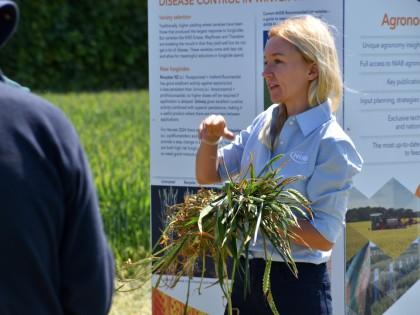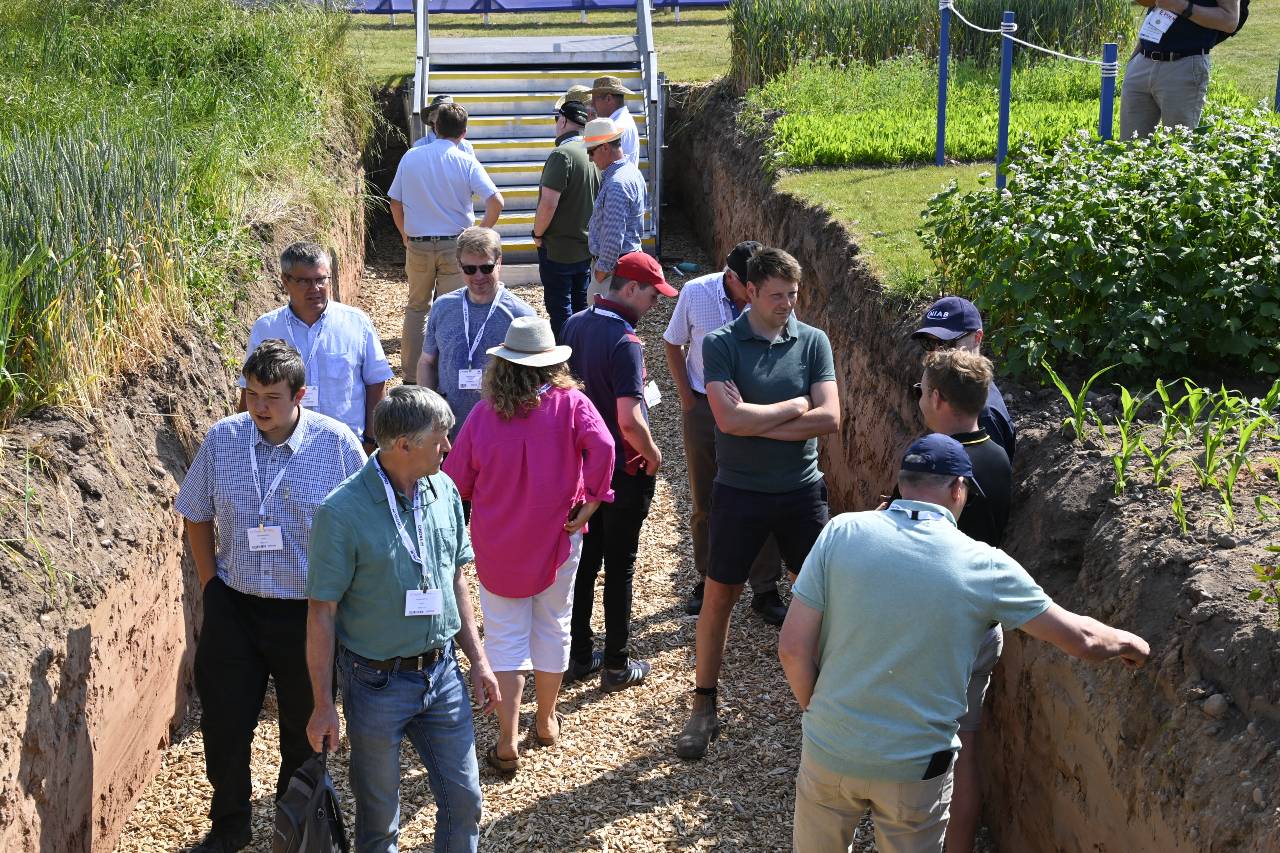- About
-
Research
- Agronomy and farming systems
-
Agricultural crop research
-
Research projects - agriculture
- About SASSA-SAI
- BioBoost
- Biomass Connect
- CTP for Sustainable Agricultural Innovation
- Climate Ready Beans - workshop presentations (March 2022)
- Crop diversity HPC cluster
- Final project workshop
- Get involved
- List of materials
- News and updates
- Partners
- The Sentinel Crop Disease Surveillance Network
- The research team
- UK Cereal Pathogen Virulence Survey
- UK wheat varieties pedigree
- Weed management - IWM Praise
- Crop breeding
- Crop characterisation
- Data sciences
- Genetics and pre-breeding
- Plant biotechnology
- Plant pathology and entomology
- Resources
-
Research projects - agriculture
- Horticultural crop research
- Crop Science Centre
- Research Projects
- Research Publications
-
Services
- Analytical Services
- Business Development
- Commercial trial services
- Membership
- Plant breeding
- Plant characterisation
- Seed certification
-
Training
-
Technical agronomy training
- Advanced crop management of bulb onions
- Advanced crop management of vegetable brassicas
- Advanced nutrient management for combinable crops
- Benefits of cover crops in arable systems
- Best practice agronomy for cereals and oilseed rape
- Developing a Successful Strategy for Spring Crops
- Disease Management and Control in Cereal Crops
- Incorporating SFI options into your rotation
- Protected Environment Horticulture – Best Practice
- Techniques for better pest management in combinable crops
- Crop inspector and seed certification
- Licensed seed sampling
-
Technical agronomy training
- News & Views
- Events
-
Knowledge Hub
- Alternative and break crops
-
Crop genetics
- POSTER: Diversity enriched wheat (2025)
- POSTER: Genetics of wheat flag leaf size (2024)
- POSTER: Wheat yield stability (2024)
- Poster: Traits for future cereal crops (2022)
- POSTER: wild wheat fragment lines (2022)
- POSTER: Improving phenotyping in crop research (2022)
- PRESENTATION: Plant breeding for regen ag
- Poster: Designing Future Wheat (2020)
- Crop nutrition
-
Crop protection
- POSTER: Understanding the hierarchy of black-grass control (2025)
- POSTER: Emerging weed threats (2025)
- POSTER: Disease control in barley (2025)
- Poster: Weed seed predation in regen-ag (2024)
- POSTER: Disease control in winter wheat (2025)
- POSTER: Mode of action (2023)
- POSTER: Inter-row cultivation for black-grass control (2022)
- POSTER: UKCPVS winter wheat yellow rust in spring 2025 (2025)
- Poster: Management of Italian ryegrass (2021)
- POSTER: UKCPVS winter wheat rusts - 2024/25 review (2025)
- POSTER: UKCPVS disease monitoring and the benefit to UK growers (2025)
- POSTER: Diagnosing and scoring crop disease using AI (2025)
- POSTER: Finding new sources of Septoria resistance (2024)
- POSTER: Fungicide resistance research (2024)
- POSTER: Detecting air-borne pathogens (2024)
- POSTER: Oilseed rape diseases (2024)
- POSTER: Fungicide resistance research (2024)
- POSTER: Improving chocolate spot resistance (2022)
- Poster: Pathogen diagnostics (2022)
- Fruit
- Regen-ag & sustainability
-
Seed certification
- POSTER: Wheat DUS (2024)
- POSTER: Innovation in variety testing (2024)
- POSTER: AI and molecular markers for soft fruit (2024)
- POSTER: Barley crop identification (2023)
- POSTER: Herbage grass crop identification (2023)
- POSTER: Herbage legume crop identification (2024)
- POSTER: Minor cereal crop inspecting (2023)
- POSTER: Pulse crop identification (2023)
- POSTER: Wheat crop identification (2023)
-
Soils and farming systems
- POSTER: Checking soil health - across space and time (2024)
- POSTER: Checking soil health - step by step (2024)
- POSTERS: Changing soil management practices (2022)
- Poster: Monitoring natural enemies & pollinators (2021)
- POSTER: Soil structure and organic matter (2024)
- POSTER: Novel wheat genotypes for regen-ag (2024)
- Video: New Farming Systems project (2021)
- Video: Saxmundham Experimental Site (2021)
- POSTER: Impact of prolonged rainfall on soil structure (2024)
- POSTER: Soil & agronomic monitoring study (2024)
- POSTER: The impact of rotations & cultivations (2024)
- VIDEO: Great Soils; soil sampling guidelines (2020)
- Poster: Soil invertebrates within arable rotations (2024)
- VIDEO: Soil health assessment (2021)
- POSTER: Saxmundham - modern P management learnings
- POSTER: Saxmundham - 125 years of phosphorus management
- Poster: Soil phosphorus - availability, uptake and management (2025)
- POSTER: Morley long term experiments (2025)
- POSTER: Exploiting novel wheat genotypes for regen-ag (2025)
- Video: Saxmundham Experimental Site (2021)
- Varieties
Putting our plant science into practice this summer

Head of NIAB Communications, Ros Lloyd outlines what you can expect at NIAB's Open Days and other events this summer.
The Cereals Event. NIAB Blackgrass Open Day. Morley Innovation Day. NIAB South Open Day. The summer events programme, of which these are just a few, is a key point in the calendar for NIAB, its customers, clients and stakeholders – have you booked your place yet?
The events are our annual opportunity to share the breadth and depth of our research work and expertise with growers and agronomists; demonstrating how they can and will be put into practice on farm and the economic and agronomic benefits in their use.
From the variety advice that NIAB is renowned for to the latest disease, weed and pest management options, via crop nutrition, soil management and a look at alternative crops.
But as NIAB CEO Professor Mario Caccamo highlights in his opening article in the Spring 2024 issue of Landmark, these trade and in-house events are also an opportunity to showcase the translation of “fundamental scientific discoveries into practical farming innovations which can boost productivity while addressing climate and biodiversity challenges.”
With over 20 different crop species in plots, at time of writing dependent on spring drilling success and if the rain ever stops, the NIAB stand at the 2024 Cereals Event on 11 and 12 June, this year near Baldock in north Hertfordshire, is a great example of this ‘plant science into practice’.
Plots will showcase research into the genetic control of yield, yield components, disease resistance and quality traits in cereal crops, with particular focus on wheat, including contrasting lines that construct yield in different ways, for example grain size, ear size and tiller number. The theme is Septoria on our pathology plots, demonstrating NIAB re-synthesised wheat lines that showed an excellent resistance against the disease in 2023.
In our legumes area, plots of peas and beans, lentils and lupins, chickpea and soya all help visitors to uncover the benefits of protein crops by exploring the opportunities for crop diversification and lowering inputs on farm and new market prospects as a plant-derived protein source in food and animal feed.
As part of the display NIAB’s research into improving UK food legumes is showcased, from work on sequencing peas and beans for nutritional quality and the presence of anti-nutritional compounds, to field trials testing how genotype/environment interactions influence crop quality. It also includes the development of genetic resources in faba beans, exploiting natural diversity to improve disease resistance against major diseases, including chocolate spot, downy mildew and Fusarium foot-rot.
The NIAB-led, multi-partner Centre for High Carbon Capture Cropping (CHCx3) project aims to help UK farmers and growers target Net Zero and build farming resilience through diversifying their arable and forage cropping. Visitors can take a look at a wide range of the UK’s underutilised and novel crops that may become more popular over the next few years on farm, and discuss crop management options with NIAB specialists and advisors. With six herbal grazing ley mixtures alongside flax, miscanthus, buckwheat, quinoa, durum wheat, and triticale growers have the option to view some of these crops above and below ground in the 20m-long NIAB Soil Hole.
This CHCx3 work is also available to discuss on NIAB’s stand at the Groundswell Event on 26 and 27 June, just down the road from the Cereals Event, where we feature our research, advice and information within the principles of regenerative agriculture. NIAB is also the sponsor of the event’s Soil Seminar Marquee, with NIAB speakers covering the science behind regenerative agriculture.

NIAB Open Days
Our traditional and popular variety demonstration plot tours are still the main feature at many, if not all our in-house events, alongside agronomy advice and opinion from our team of crop specialists with a range of plots covering disease management, nitrogen strategies, soil and rotation management and weed control.
Two specialist events kick off proceedings with a new location for our Black-grass Open Day, the first open event covering the grassweed since before the pandemic. Both this open day on 3 June and our Diverse Weeds Event, a demonstration of sustainable
management of broad-leaved weeds, on 4 June will take place at our CambridgeHinxton trials site.
Of the regional NIAB Open Days, our southern event is back at Sutton Scotney, in Hampshire, on 18June with a range of practical variety and agronomy demonstrations. Our Cambridge Open Day is a ‘no-show’ this year due to the nearby Cereals Event, but will be back in 2025.
We are also running NIAB plot tours as part of the Morley Innovation Day in Norfolk, hosted by The Morley Agricultural Foundation on 20 June, this year in partnership with the AHDB Strategic Cereals Farm (East) Open Day, and at the Croft Arable Event in Co Durham, hosted by Croft Farms alongside event partner ArGrain, this year a little later on 2 July. Both events combine field demonstrations with exhibits with research partners, funders and industry, ensuring the latest independent information and advice from a wide range of specialists.
Book your place on a NIAB Open Day
This article originally appeared in the Spring 2024 edition of NIAB’s Landmark magazine. Landmark features in-depth technical articles on all aspects of NIAB crop research, comment and advice. You can sign up for free and get Landmark delivered to your door or inbox:





